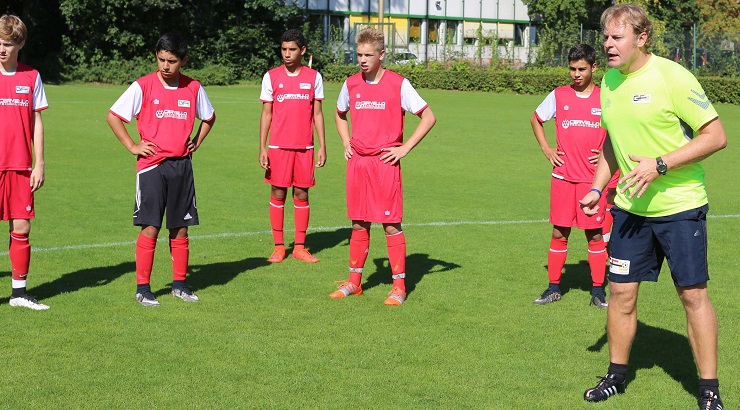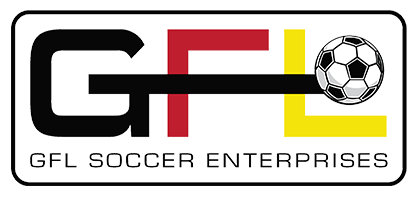Exploring Youth Soccer In Germany & Taking Players to The Next Level
A native of Lithuania, Eddie Loewen grew up in Germany and got his start as a soccer player with youth soccer clubs FC Preussen Espelkamp and SC Herford before starting his professional career with FC Remscheid in 1998. In 2000, Loewen headed to Berry College in Georgia, where he received a BA in Health & Physical Education.
GFL Soccer trains elite youth soccer players and organizes teams to play in Germany against German teams, such as FC Bayern Munich, TSV Munich 1860, Fortuna Dusseldorf, FC Cologne and Fortuna Koln among many others. Ever since Germany won their fourth World Cup title in 2014, there has been a growing interest in how the country develops their youth players.
When Mario Gotze’s extra-time goal won the 2014 FIFA World Cup Final against Argentina, the resurgence of German soccer kicked in to full force.
All of a sudden, Americans remembered Germany’s track record for player development. Of course soccer is the country’s most popular sport — with more than 26,000 soccer clubs and the highly respected Bundesliga soccer league — but few Americans seemed to realize that Germany is considered by many to be the second most successful soccer country in the world, only second to Brazil.
Related Article: Improving Youth Soccer Development: Eddie Loewen – SoccerToday
If you want to learn soccer, visiting and training in Germany is wise. Germany has a long history of excellence in soccer dating back more than a century – and, in the last fifteen years, Germany has invested nearly $1 billion in its youth programs, with professional Bundesliga league youth academies with full-time coaches.
GFL’s CEO, Eddie Loewen grew up playing soccer in Germany and launched a series of programs to help players cross the Atlantic to discover how hyper competitive soccer fanatics prepare to advance and seek dominance.
Related Article: Eddie Loewen on Raising the Level of the Game
The GFL program identifies talented players through a series of soccer camps, ID Clinics, and comprehensive sorting at selected games and tournaments. Youth soccer players can also be recommended by well established and highly respected soccer coaches. After being chosen to represent the USA as GFL travels back to Germany, the youth soccer players train together in preparation to play against Bundesliga academy teams and experience the German style of play. Being immersed in the culture of soccer in a country steeped in a rich tradition of apprenticeships and the methodical development of young talent is an amazing lifetime experience.
SoccerToday interviewed Eddie Loewen, CEO of GFL Soccer about GFL’s Germany trips and his take on American youth soccer today.
Diane Scavuzzo: What is your coaching philosophy?
Eddie Loewen: Every youth soccer player needs to get better and needs to be challenged in every training session and every game.
As a coach I have to manipulate — plan, organize, intervene, adjust — the environment accordingly in training and games so that this goal is met for every player.
Attention to detail is also very important to me. In German we say “Der Teufel steckt im Detail” — or in other words, the devil is in the details.
I like to possess the ball with purpose and be quick in transition. Youth soccer players need to be willing to go a high tempo and invest a lot physically throughout the game.
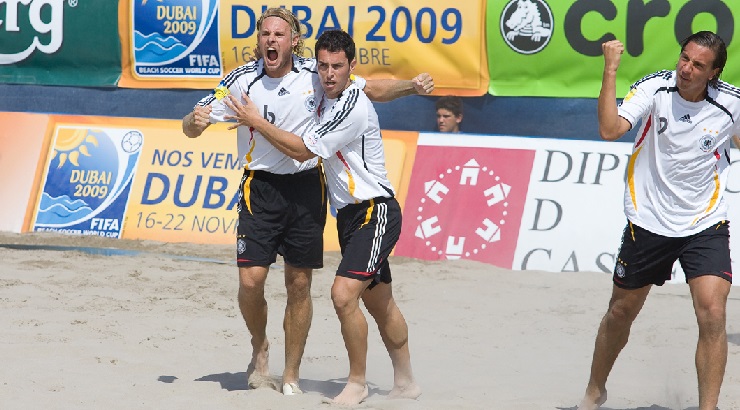
Diane Scavuzzo: What is the biggest difference between American youth soccer players and their German counterparts? Have American elite players improved in the past decade?
Related Article: Eddie Loewen Talks German Football League
Eddie Loewen: The level of American players has definitely improved over the past decade. We are developing more and more technically and tactically sound players, but the main difference I see is the intensity of how their counterparts in Germany address the game.
Every training session, and definitely every game, means something important. Especially U15 and up, there is much more at stake in League competitions — Relegation and Promotion — and therefore it’s a constant battle. This constant pressure creates the biggest separation between USA youth soccer players and their German counterparts.
I also think the pay-to-play system is counter productive to American youth soccer, especially at the elite levels.
It is a positive step that several of the USSF Development Academies are covering the cost for players to train.
An elite player in a U17 German Academy, such as TSG Hoffenheim, has a 80-100 hour week including school, after school work, training, team meetings and individual meetings — there is not much room or time for anything else. It is a very professional environment and almost every minute is planned out.
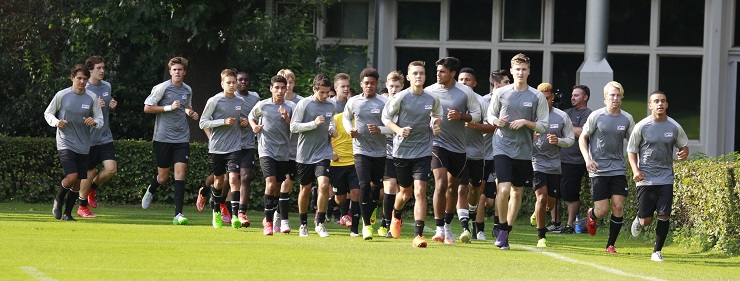
Diane Scavuzzo: Has there been any concern about having these players in such a demanding and strict schedule?
Eddie Loewen: There have been discussions if this is healthy for the youth players because at the end of the day they are still kids and teenagers. In my time as a youth player in Germany, it was very different — not as professionalized, even on the highest level.
Related Article: Exploring Youth Soccer in Germany – 2017 GFL Youth Soccer Trip
However, to be honest, when we had free time — guess where you would find us? On the “Bolzplatz” which is a street soccer or a street futsal court.
Diane Scavuzzo: What do you look for when selecting youth soccer players for your program?
Eddie Loewen: Obviously you notice right away if someone has good technique, good tactical understanding and is fast or strong — but besides that I look for a special mentality.
In my view, mentality will always beat talent.
Diane Scavuzzo: What makes a youth soccer player successful when playing overseas against Bundesliga academy players?
Eddie Loewen: You have to be a competitor, wanting to win every challenge, every 1v1, every training game and obviously every match that you play in. You need to have a certain “aggressiveness” to be a good competitor.
One of the most common things that our players notice when playing against German Bundesliga Youth teams is their physical play — they play with every inch of their body within the laws of the game.
In the USA, we have the problem that we either don’t teach or encourage our players to play physical and if we do, the referee doesn’t encourage it.
Most situations that are called a foul in the USA would never be considered a foul in Germany.
Why? Because the majority of German referees on the youth or adult level have played the game and have experience in the game.
Unfortunately we have so many referees in the USA who have never kicked a ball in their life — or at least played at an elite level — but they have to officiate a game and that makes it hard to make the right calls when it comes to physicality.
Don’t get me wrong, I am not bashing referees, I am only saying that having played the game helps you understand and interpreted the laws of the game better. I believe that in Germany, the game is allowed to be played much more physically than it is here because the majority of referees have played or are still playing the game.
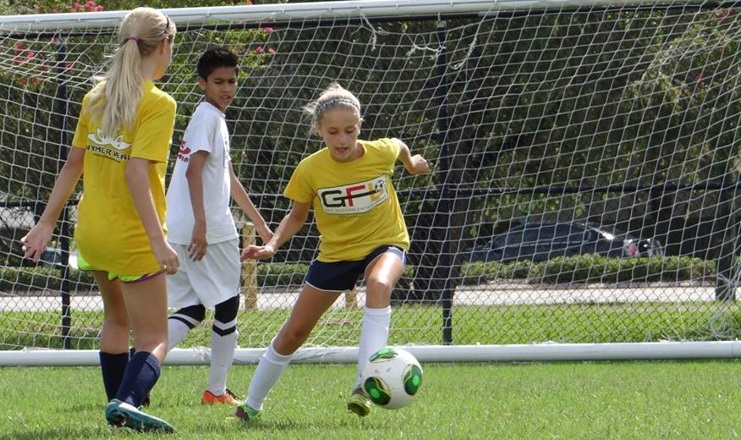
Diane Scavuzzo: GLF Trips to Germany – What are the benefits for a youth soccer player exploring the world on a trip like yours?
Eddie Loewen: They get to see how a player at their age in Germany approaches the game on the highest level; they can measure themselves with Germany’s elite at their age. Players have the opportunity to be immersed into the German soccer culture for two weeks and they will be forced to go to their limits — and that only makes them better soccer players.
Most of the youth soccer players that return home to their soccer clubs with a special fire and enthusiasm from all the lessons learned, — they make an impact within their own circles which can help to elevate the game here in the USA — player by player, team by team.
Diane Scavuzzo: What are the challenges of creating a team from 15 youth soccer player who are strangers?
Eddie Loewen: It is obviously not easy to form team spirit within a couple of days but a couple of things that help us are:
We room players of the same positions from each team — for example we room the strikers together and goalkeepers together — that way, the players start a bond off the field which translates on the field.
The locker rooms — something many of our USA players are not used to — also provides a special environment. Each team in Germany has their own locker room and it is the “players cave”, where they get ready before training, games, talk and socialize. So many things happen in the locker room that are very important for a team and we try to use it as much to our advantage as possible.
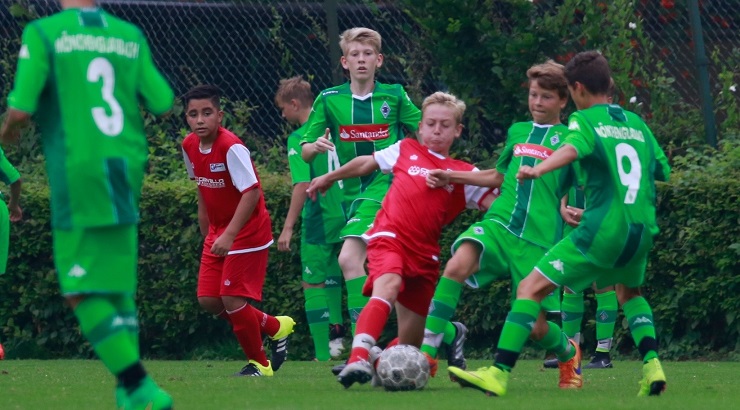
Diane Scavuzzo: How much training are the players able to have — to become familiar with each other —prior to playing against a German youth team? What level academies will the teams be playing?
Related Article:
Eddie Loewen: In most cases we are able to train 2 to 3 times as a whole team together before we play our first match.
Diane Scavuzzo: Can you provide which Bundesliga Youth Academy Teams your players will be playing?
Eddie Loewen: Current teams that are confirmed are: FC Koln, Borussia Moenchengladbach, MSV Duisburg, Fortuna Duesseldorf and RW Essen, with more to come.
Diane Scavuzzo: What are the accommodations like?
Eddie Loewen: It is one of Germany’s finest Sports Schools and also the Headquarters for the Region. It is a dream come true for a soccer fan. Players can walk from their rooms to almost directly onto the fields and we have the absolute best facilities in terms of grass, lockers rooms and meeting rooms.
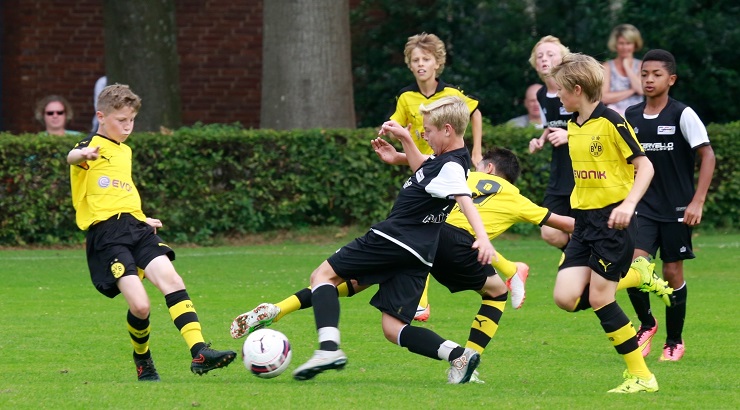
Diane Scavuzzo: As CEO, what is your role at GFL?
Eddie Loewen: My role as CEO is to look for opportunities of growth and expansion for GFL and keep the high quality of product that we offer by nurturing and building the relationships in Germany with the Pro Clubs and the DFB.
We would like to grow the awareness of the opportunities that we offer especially in the California and Texas market and with more girl players, as I believe that our US girls can benefit from a trip as well.
GFL is also interested in working closer with Colleges in the U.S. to help players from our Select Teams who are not offered contracts on a professional level — and, we also have a lot of requests from European players that don’t make a professional team to come and play for a College here in the USA.
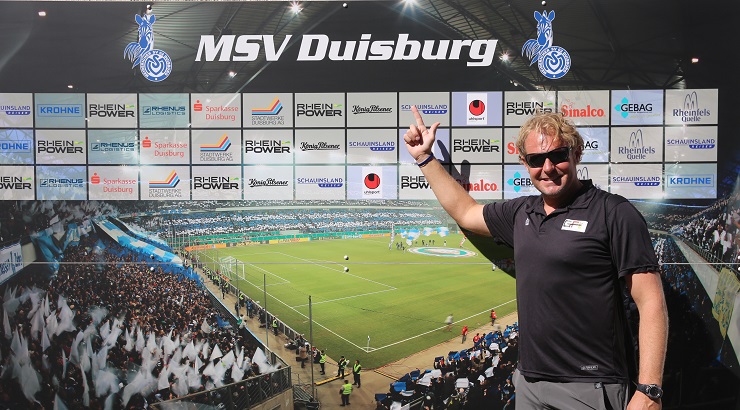
Diane Scavuzzo: Are European youth players interested in visiting the USA?
Eddie Loewen: Yes, we have many inquiries about that and we are currently starting to invest resources to capture that aspect of the market.
Diane Scavuzzo: What is the biggest challenge facing youth soccer in America?
Eddie Loewen: The pay-to-play system is a big challenge and the ability/opportunity to engage in “free play” — youth soccer players need the opportunity to play without the interference of coaches or parents — an environment that enables the players to be creative, make mistakes, and figure out by themselves what works and what doesn’t.
It’s important for players to have an environment that enables them to make up their own games, rules, stand up for themselves, fight for themselves and play with passion without anybody looking over their shoulders constantly.
Coaching is important, but in many cases our players get “over-coached” and they lose the ability to be free and creative and make their own decisions on the field. I often come to soccer fields in the US and it feels like you are in a library — no players are talking and the only one you hear is the coach — that is a problem.
Diane Scavuzzo: How do you think the small sided games mandate will benefit development?
Eddie Loewen: I like small sided games and think it will help with the development of players that will be better on the ball and make quicker decisions. However you also need to have the coaches that know how to implement these changes correctly, so it will be a long learning process and we will have to see over time if this approach will bear the fruits that we hope for.
Diane Scavuzzo: What are your thoughts on the birth year mandate? How are youth soccer players’ teams set up in Germany?
Eddie Loewen: I don’t think the birth year mandate will really change player development, but it helps the U.S. Soccer to be uniform with the rest of the world — and if we want to compete with the rest of the world, this is something that had to be done. In Germany youth teams are organized by birth year.
Diane Scavuzzo: Who is your favorite soccer team and player?
Eddie Loewen: I have been a supporter of Bayern Munich since I was 5 years old and my favorite players are Ze Roberto, Jorginho and Lothar Mattheaus.
Related Article: ONE. SOCCER SCHOOLS PARTNER WITH GFL SOCCER

